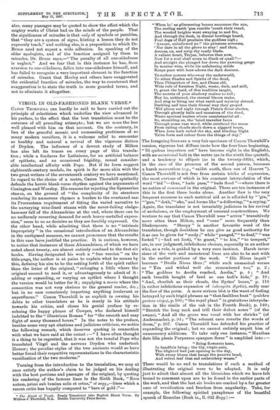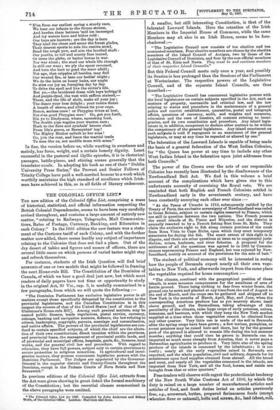VIRGIL IN OLD-FASHIONED BLANK VERSE.* CANON THORNHILL can hardly be
said to have carried out the principle of eclecticism which underlies the view advanced in his preface, to the effect that the best translation must be the outcome of all preceding attempts ; but we are none the less well pleased with him on that account. On the contrary, in lien of the graceful mosaic and unmeaning prettiness of so many modern versifiers, it is a welcome relief to encounter so healthy and natural a revival of the vigorous diction of Dryden. The influence of a devout study of Milton has also left its traces on every page of this transla- tion; while a fondness for Latiniems, for an artificial balance of epithets, and an occasional frigidity, reveal consider- able intellectual affinity with Pope. But if its form suggest eighteenth-century models, its spirit is far more akin with the two great writers of the seventeenth century we have mentioned. In regard to the choice of a metre, Canon Thornhill spiritedly defends the heroic blank-verse rhythm against the arguments of Conington and Woreley. His reasons for rejecting the Spenserian stanza, on the ground of "the complexity of its structure rendering its numerous rhymes a burden to the overtaxed ear, its Procrustean requirement of fitting the varied narrative to the unvarying nine-lined stanza with the never-failing sledge. hammer fall of the Alexandrine at the end, where there can be no uniformly recurring demand for such heavy-metalled expres- sion," seem to us as decisive as they are forcibly expressed. On the other hand, while admitting that there is no " intrinsic impropriety " in the occasional introduction of an Alexandrine in the unrhymed measure, we cannot pronounce that the results in this case have justified the practice. It is curious, however, to notice that instances of these Alexandrines, of which we have noted about twenty, are almost entirely confined to the first six books. Having designated his work a "free version" on the title-page, the author is at pains to explain what he means by this, defining his aim to be the setting forth of the spirit rather than the letter of the original, " enlarging a little where the original seemed to need it, or advantageously to admit of it : adding or expanding, or varying au epithet where I thought the version would be better for it ; supplying a nesse where the connection was not very obvious to the general reader, Ac. ; but in no case consciously importing anything irrelevant or superfluous." Canon Thornhill is as explicit in owning his debts to other translators as he is manly in his attitude towards his critics, and closes his genial preface by re- echoing the happy phrase of Cowper, who declared himself indebted to the " illustrious Roman" for "the smooth and easy flight of many thousand hours." In the notes to the preface, besides some very apt citations and judicious criticism, we notice the following remark, which deserves quoting in connection with what we have said at the outset :—" I have often thought it a thing to be regretted, that it was not the tuneful Pope who translated Virgil and the nervous Dryden who undertook Homer ; the peculiar styles of the two ancients would so have better found their respective representations in the characteristic versification of the two moderns."
Turning from the introduction to the translation, we may at once satisfy the author's claim to be judged on his dealing with the best portions and passages of the original, by quoting his rendering of the famous lines in the Sixth Book, " Ecce antem, primi sub lumina solis et ortus," et segg.,—linee which a recent critic has happily compared to "bars of gold :"— The Igneid of Virgil. Freely Translated into English Blank Verse. By William J. Thornhill, B.A. Dahlia University Press Series.
" When lo! as glimmering beams announce the sun, The reeling earth 'gan rumble 'neath their tread, The wooded heights went swaying to and fro, And through the dusk, in dismal howlings heard, Foul doge of Hell proclaim the goddess nigh ; 'Avatint, unhallowed ye !' the priestess screams, ' Nor dare in all the grove to stay! and thou, Aeneas, on, and strip thy ready blade.
A valiant heart, Trojan, behoves thee now, Now for a soul shall scorn to flineh or quail!'— And straight she plunged her down the yawning gorge In maniac wise, while his unfaltering stride Keeps pace with here adown the dark descent.
Ye nether powers who sway the underworld, Ye silent Shades and Spirits of the dead, Thou Phlegethon of fire, and Chaos old, Wide rule of formless Night, waste, dark, and still, 0, grant the bard, of dim tradition taught, The secrets of your shadowy realms to tell; May he, uublamed, the eternal blazon make, And sing to living ear what earth and mystery shroud.
Darkling and lone their dismal way they groped 'Mid gloom and night through Pluto's drear abodes, Through ghostly halls and mansions of the dead, Waste spectral realms where unsubstantial all .
So, stumbling on, the 'lated traveller fares
Through some vast wood, while overhead the moon From sailing clouds sheds down a niggard beam,
When Jove bath veiled the sky, and blinding Night Ta'en form and colour from the things of day."
The foregoing lines are a very fair specimen of Canon Thornhill'e version, vigorous but diffuse (note how the four lines beginning, "Di qtribus imperinm est" have become eight in the English), with an occasional halt in the metre (as in the ninth line quoted), and a tendency to ellipsis (as in the twenty-fifth), which, in the case of the pronoun of the second person, becomes a harsh mannerism (e.g., " saidst sooth, thou son of Heaven "). Canon Thornhill is not free from certain tricks of expression, the most enrious of which is his constant interpolation of the word " bid "—thus, " bade pass," " bade flood "—where there is no notion of command in the original. There are ten instances of this in the first three books alone. Another flaw is the very frequent recourse to such metrical aid as is afforded by "'gin," "'gas," " doth," " eke," and forms like " a-following,""a-crying." Again, the translator is not invariably judicious in his revival of archaisms, or the employment of unusual constructions. We venture to say that Cauon Thornhill uses " arrive " transitively more often than Milton, and " sans " more frequently than Shakespeare. " Steepy " is another favourite word of the translator, though doubtless he can give as good authority for it ae can ho given for " cooly ;" while" panged," " to deaf," " was footed " (= had set foot), " to guest," " to kin," " to tempest," are, in our judgment, infelicitous choices, especially in an author who, as a rule, is guided by a very sure instinct. Harsh inver- sions of the verb and unmetrical lines are also to be met with in the earlier portions of the work. "Hie Nieue inquit " becomes " Drolls Nieue thus ;" while such unmusical verses as " Yea and withal well she remembered too," p. 2 ; " The goddess to Aeolia reached, Aeolia," p. 4 ; " And such breadth bought of land as one bull's hide," p. 19; "And, churlish as their shoals, the Syrtes' boors," p. 118 (a rather infelicitous expansion of inhospita Syrtis), sadly mar the flow of the poem. A more serious blot is the want of feeling betrayed by such frigid phrases as " that faultless bust" (pulch,ro pectore virgo), " the royal plant" (a gratuitous interpola- tion in the simile of the oak in the Fourth Book), p. 140; "Stretch the long neck and trill their dulcet notes" (of the swans), "And all the grove was vocal with her shrieks" (of Andromache), p. 91; "The reboant cave reverbs the words of doom," p. 207. Canon Thornhill has defended his practice of expanding the original ; but we cannot entirely acquit him of unnecessary additions. To take only one instance, " Manibris date lilia plenis Purpureos spargam &ores " is amplified into :— " Bring flowerets here, In handfuls bring; the lily, virgin-pale, The blighted bud just opening to the day, With every bloom that hangs the pensive head, And velvet leaf that sad embroidery wears."
There would be no end to translations if such a method of illustrating the original were to be adopted. It is only just to admit that almost all the blemishes which we have felt bound to comment upon are to be found in the earlier parts of the work, and that the last six books are marked by a far greater ease of versification and freedom from angularity. Take, for example, the following spirited paraphrase of the boastful speech of Remnlue (Book ix., II. 602 Beqq.):—•
"E'en from our earliest spring a sturdy race, We bear our infants to the frozen stream, And harden them betimes 'mid ice immerged And icy waters keen and bitter cold : Our boys are hunters; ere the day is born They tend the chase and scour the forest glades, Their dearest sports to rein the restive steed, Bend the tough yew, and aim the levelled shaft Our youths, to toil and scanty fare inured, Or tame the glebe, or batter towns in war. Nor war alone ; the steel our whole life through Is still our wear; we ply the spear reversed, And turn the butt to goad the steer afield ; Not age, that oripples all besides, may dull Oar wonted fire, or bate our bodies' might ; We do the helm on hoary hairs, nor aught So stirs our joy as, forraying day by day To drive the spoil and live the mimes life. But ye,—the broidered dress with toys befripp'd And purple-dyed, the vest with saffron stained,— These, and the life of sloth, make all your joy ; The dance your best delight ; your tunics flaunt A length of sleeve, and ribbons tie your cape. Hence, sexless crew ! or Phrygian wives at beet, Not e'en good Phrygian men ! Go, get you forth, Hie ye to Dindymus, where, squeaking loud, The double pipe regales your wanton ears ; Hark to the flute and cymbals' brazen clash From Ida's grove, or Bereoyntas' top ! The Mighty Mother calleth to her eons ! Go, join the rout, and leave the martial trade To men like us, nor meddle more with arms."
In fine, the version before us, while wanting in sweetness and melody, has force, weight, and a certain homely dignity. Least successful in the pastoral and idyllic episodes, it is in rhetorical passages, battle-pieces, and stirring scenes generally that the translator excels. In adopting his book as one of their" Dublin University Press Series," the Provost and Senior Fellows of Trinity College have paid a well-merited honour to a work which worthily maintains the high standard of excellence which Irish- men have achieved in this, as in all fields of literary endeavour.



















































 Previous page
Previous page